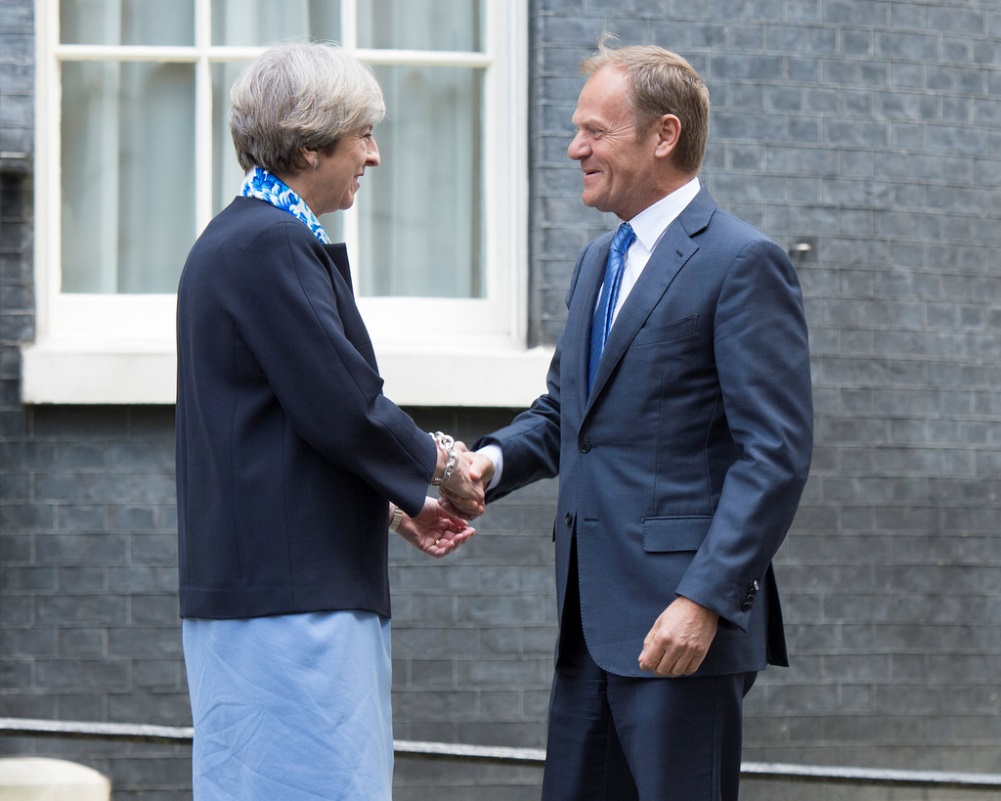By: Mattia Cutolo

UK Prime Minister Theresa May signs a letter to the President of the European Council, beginning the process of withdrawing the UK from the European Union. [Prime Minister’s Office via Flickr, CC BY-NC-ND 2.0]
The following analysis sets its framework on a particular date: Wednesday March 29th, when Theresa May “Brexit!” dixit (latin: “When Theresa May said: “Brexit!”). That is when the UK Ambassador to the EU, Tim Barrow, delivered a letter signed by Prime Minister Theresa May to European Council President Donald Tusk. By doing so, Prime Minister May triggered Article 50 of the Treaty of Lisbon and put in motion the UK’s withdrawal from the European Union. “It is not a happy day,” said President Tusk.
The British approach to the UK’s withdrawal has perhaps annoyed Monsieur Jean-Claude Juncker (President of the European Commission) who appointed Monsieur Michel Barnier (former Vice-President of the European Commission and former French Minister) as “Chief Negotiator in charge of leading the Commission Taskforce for the Preparation and Conduct of the Negotiations with the United Kingdom under Article 50 of the TEU.” Barnier has already said that the negotiations will take place in French and not in English, suggesting that English may no longer be a European Union language once the UK leaves.

[Christopher Michel via Flickr, CC BY 2.0]
John Cassidy of the New Yorker recently wrote that the Brexit “referendum, in which 51.9 per cent of the people who voted signaled a preference to leave the E.U., represented a victory for the old, the less-educated, and the xenophobic. The young, the college-educated, and the outward-looking all rejected, and still reject, Brexit.” This description is incomplete, however: according to data reported by the Italian Former Prime Minister Enrico Letta in an interview with “Il Giornale” after the referendum, only 36% of voters between the ages of 18 to 24 voted in June, compared with 83% of voters older than 65 (although at least one analysis claims that turnout among voters may be twice that number, citing figures of 64% and 90% turnout among these age groups respectively). If the lower figure is correct, that means that just one in three youths decided to vote in this major election (young people voted overwhelmingly to remain in the EU). This large discrepancy highlights the different kind of motivation that pro-Brexit supporters had in voting to leave. As a consequence, if there is still such a lack of trust towards the EU now—after sixty years of peace and implementation of shared European principles, European citizenship, the single European market and the free movement of citizens, jobs, services and capitals—it means that the European institutions have paid a price for a perceived lack of transparency (of the Eurogroup, above all), lack of representation, and austerity.
Some, however, are skeptical that the UK can really separate itself from the European Union in the way imagined by pro-Brexit voters. Martin Wolf (economics commentator for the Financial Times), for example, has said that London will depend on Brussels anyway after leaving the EU, and the only difference will be the fact that the UK will not have the chance to change or intervene in EU economic politics. Indeed, the Pound is not stable: it has fallen 20% in the last nine months. While this devaluation helps exports “made in Britain,” it also means increased costs of raw materials, inflation, and negative consequences for consumer spending. The EU market used to be the most balanced in the world—not anymore.
Across Europe, it has become increasingly popular to campaign against the EU, Euro, Central Bank, and the European Commission’s lack of democratic representation in the past few years. The right parties of the occidental world—with leaders ranging from Theresa May (UK) to Donald Trump (US), Marine Le Pen (France), and Matteo Salvini (Italy)—are embodying a new type of conservatism which is deeply different from Reagan’s and Thatcher’s. It is nationalism and protectionism with the aim of closing national borders and maintaining the highest possible levels of State sovereignty. It is not a coincidence that these politicians want to put to a popular vote every decision that is difficult to deal with, such as remaining in or leaving the EU, changing European Central Bank policy, or immigration agreements. It is easier, for example, for Madame Le Pen to ask the French people if they are willing to stay within the European Union than to go to Brussels to fix complicated EU policies with other EU Member States.

UK Prime Minister Theresa May meets with President of the European Union Donald Tusk in London. [Prime Minister’s Office via Flickr, CC BY-NC-ND 2.0]
However, as Monsieur Giscard d’Estaing (former Chair of the Convention on the Future of Europe) has said, we should remind euro-skeptics that Europe has one of the highest gross domestic products (GDP) which amounts to about 16 trillion dollars, and it constitutes the second biggest commercial zone in the world, including both imports and exports (only China has done better in 2016). It is therefore not by coincidence that the Obama Administration was so interested in the Transatlantic Trade and Investment Partnership (TTIP).
A fil rouge links all these new right and euro-skeptical leaders and it is the belief that often foreigners constitute threats to the internal balance of a sovereign State. However, it is not corroborated by facts—as the Economist points out, there have been very few terrorist attacks in the United States committed by foreigners, for example. Therefore, immigration and refugee policies that seek to describe immigrants as national security threats “is a wrong equation, an unacceptable equation,” said Marco Minniti, Italian Minister of the Interior (about Trump’s immigration policies).
To conclude, from these new international events, it seems more popular to make the most conservative choice, building walls, in order to protect people, families, and countries. However, the best choice might be to instead build doors, in order not only to protect our individual countries but, in particular, to regularize the world itself.
